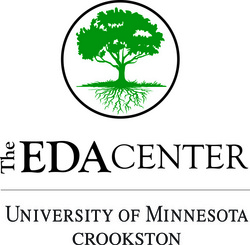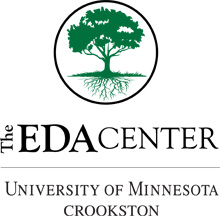 The University of Minnesota, Crookston, home to the Economic Development Administration (EDA) University Center, is a partner on a $4.7 million federal grant awarded to the Blandin Foundation and 19 coalition partners to enhance broadband access in Minnesota's rural areas. Through the Broadband Technology Opportunities Program grant, the Minnesota Intelligent Rural Communities coalition will bring a network of resources and support to rural Minnesota individuals and communities--especially those unemployed and seeking employment, small businesses, coalitions of government entities, and local leaders. The Blandin Foundation will administer the grant on behalf of the initiative's partners.
The University of Minnesota, Crookston, home to the Economic Development Administration (EDA) University Center, is a partner on a $4.7 million federal grant awarded to the Blandin Foundation and 19 coalition partners to enhance broadband access in Minnesota's rural areas. Through the Broadband Technology Opportunities Program grant, the Minnesota Intelligent Rural Communities coalition will bring a network of resources and support to rural Minnesota individuals and communities--especially those unemployed and seeking employment, small businesses, coalitions of government entities, and local leaders. The Blandin Foundation will administer the grant on behalf of the initiative's partners. The EDA Center, under the leadership of Center Director Jack Geller, will serve a vital role as project evaluator for the grant. Designed to bring together partners from across a wide spectrum, the grant will provide funding to carry out an array of projects. As evaluator, the EDA Center will design and conduct research on the projects, collect data, and measure the impact and effectiveness of the grant's activities. Some $459,900 is set aside for the evaluation aspect of the grant. Faculty and staff from across the University will have an opportunity to be engaged in research on projects related to the grant's objectives.
Geller is keenly aware of the significant impact improving technology access would have for those who live and work in rural Minnesota. "This grant is a very significant and comprehensive approach to targeting rural communities and those who lack access to technologies that could prove to be critically important to them," Geller states. "We will broaden awareness, provide essential technical assistance, and help those who may not even be online yet. We want to maximize this opportunity to assist rural businesses and help them adopt new technologies, increase their market share, reach new customers, and improve their bottom line."
Total cost of the coalition's proposed projects is estimated at more than $6 million. Minnesota Intelligent Rural Communities coalition members will contribute $1.3 million in resources as matching funds toward the effort. The Blandin Foundation submitted the application for federal broadband stimulus funding on behalf of University of Minnesota Extension Center for Community Vitality, Minnesota State Colleges and Universities, University of Minnesota Crookston, Association of Minnesota Counties and their national counterpart, Network of Care Mental Health, Intelligent Community Forum, Minnesota Renewable Energy Marketplace, Minnesota Department of Economic Development Workforce Centers, PCs for People and Minnesota's nine Regional Development Commissions.
The mission of the EDA Center, located on the Crookston Campus, is to engage university faculty, staff and students with local, county and regional economic development agencies in support of the rural economy. For more information, contact Geller at 218-281-8248 or visit the EDA Center's Web site at www.edacenter.org.
Today the University of Minnesota, Crookston delivers more than 25 bachelor's degree programs and 50 concentrations, including several online degrees, in agriculture and natural resources; arts, humanities and social sciences; business; and math, science and technology. With an enrollment of about 1,300 undergraduates, the Crookston campus offers a supportive, close-knit atmosphere that leads to a prestigious University of Minnesota degree. "Small Campus. Big Degree." To learn more, visit www.umcrookston.edu.
Contact: Jack Geller, director, EDA Center, 218-281-8248 (gelle045@umn.edu); Elizabeth Tollefson, assistant director, communications, 218-281-8432 (ltollefs@umn.edu)


